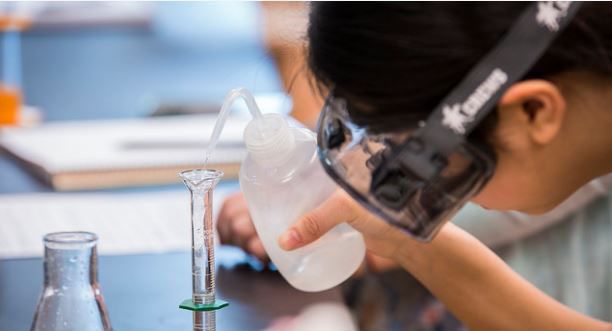
Manchester University gets $646,000 National Science Foundation grant for STEM academy
NORTH MANCHESTER, Ind. – The National Science Foundation has awarded Manchester University a $646,134 grant for scholarships to help serve academically talented students with high financial need who wish to pursue science majors.
With this award, Manchester is launching the STEM Pathways Academy to provide a clear, guided path to graduation and success in employment or graduate school. STEM stands for science, technology, engineering and math.
Drawing from Indiana, and as far away as Virginia and Texas, Manchester has recruited 13 students for the first academy cohort, which begins in fall 2017.
Within the already close-knit Manchester community, the academy will form a learning group where students take classes together, work with professional, alumni and student mentors, and take yearly seminars that focus on career preparation.
The STEM Pathways Academy will provide site visits to science employers and graduate schools, rich internship and research experiences, and specialized classes designed for hands-on learning. The academy is under the direction of MU faculty members Kristen Short (biology) and Kathryn Davis (chemistry).
“Through this program, we will design classes and programming that support student success in STEM fields. The goal is to take what works best and expand those practices to other students studying the sciences and across all disciplines at the University,” Short said.
“The five-year grant from the National Science Foundation offers a unique opportunity for Manchester to serve students who have a passion for studying science and will benefit most from scholarships and special programming,” she said. “It allows us to build on an already strong tradition of preparing students for employment out of school or for graduate programs.”
More than half of the first academy cohort is made up of women, which is in line with Manchester’s strong tradition of women in the sciences. Women make up more than half of the MU students in STEM-related areas of study, and nearly half of those professors are female. The group is ethnically and culturally diverse.
“Through the STEM Pathways Academy, Manchester will help increase the number of STEM students – and ultimately professionals – from underrepresented backgrounds by actively recruiting from a diverse pool of applicants,” Davis said.
“We will provide an educational experience that guides, supports and positions graduates to make significant contributions as STEM professionals. Manchester’s Mission Statement calls upon us to improve the human condition, and Academy graduates will be in a position to do just that,” she said.
Manchester is looking for more partners to build and enhance its relationships within the medical device and design industry, as well as other STEM industries, to provide access to mentors, internships, campus visits, site visits and other field experiences.
About 10 students will be recruited for a second Academy cohort to begin in the fall of 2018.
Manchester STEM graduates report an impressive success rate, with 97.7 percent of 2016 graduates in the sciences reporting being employed or furthering their education within six months after graduation.
-30-
Contacts:- Kristen Short, Ph.D., assistant professor of biology, can be reached at khshort@manchester.edu to set up a phone or email interview.
- Kathryn Davis, Ph.D., associate professor of chemistry, can be reached at 260-982-5575 or kldavis@manchester.edu.
About Manchester University
Manchester University, with campuses in North Manchester and Fort Wayne, Ind., offers more than 60 areas of academic study to 1,600 students in undergraduate programs, a Master of Athletic Training, a Master of Pharmacogenomics and a four-year professional Doctor of Pharmacy. It has students from 20 nations and is home to the world's first undergraduate peace studies program, established in 1948. Learn more about the private, northern Indiana school at www.manchester.edu.
June 2017